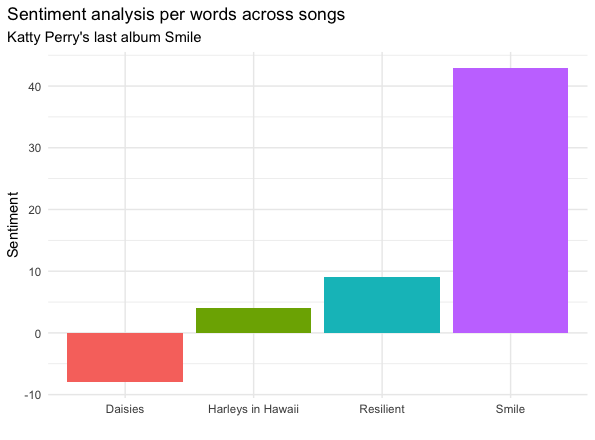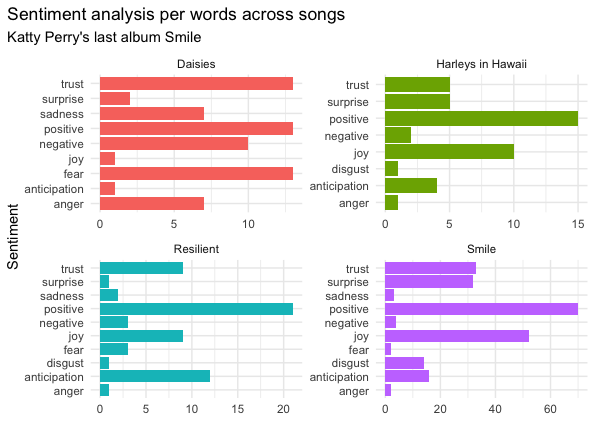Sentiment analysis on Katty Perry upcoming album Smile.
Smile is the upcoming sixth studio album by American singer Katy Perry. It is scheduled to be released in two weeks time, on August 28 2020. Perry describes her last album Smile as her “journey towards the light, with stories of resilience, hope, and love”. According to her, she has gone through some emotionally challenged times lately, and expecting a child could just add more into that emotional roller coaster 🎢.

library(tidyverse)
library(genius)
library(tidytext)
library(tidymodels)
library(blogdown)I am going to obtain the lyrics of that album trough Genius (world’s biggest collection of song lyrics and musical knowledge) using the genius package.
Getting data
smile_raw<-genius_album(artist = "Katy Perry", album = "Smile")Data preparation
tidy_smile <- smile_raw %>%
unnest_tokens(word, lyric)
tidy_smile %>% count(track_title)## # A tibble: 12 x 2
## track_title n
## <chr> <int>
## 1 Champagne Problems 18
## 2 Cry About It Later 92
## 3 Daisies 1
## 4 Harleys in Hawaii 339
## 5 Never Really Over 1
## 6 Not the End of the World 60
## 7 Only Love 18
## 8 Resilient 213
## 9 Smile 333
## 10 Teary Eyes 81
## 11 Tucked 1
## 12 What Makes a Woman 1smile_raw %>% filter(track_title=="Tucked")## # A tibble: 1 x 4
## track_n line lyric track_title
## <int> <int> <chr> <chr>
## 1 9 NA <NA> TuckedWe can do text analysis using the fantastic tidytext package. To use tidytext, we need to tokenise words to extract meaning and use tidytext’s sentiment analysis capabilities.
We can use unnest_tokens function uses the tokenizers package to separate each lyric line into words. The default tokenizing is for words, but other options include characters, n-grams, sentences, lines, paragraphs, or separation around a regex pattern.
We realised the lyrics of some songs have yet to be released.
tidy_smile <- tidy_smile %>%
anti_join(get_stopwords())We can remove stop words (available via the function get_stopwords()) with an anti_join().
Lets count the frequency of words.
tidy_smile %>%
count(word, sort = TRUE) ## # A tibble: 233 x 2
## word n
## <chr> <int>
## 1 smile 19
## 2 oh 17
## 3 baby 16
## 4 back 15
## 5 now 15
## 6 cause 13
## 7 finally 12
## 8 got 11
## 9 grateful 11
## 10 jeweler 11
## # … with 223 more rowsThere is a range of methods and dictionaries for evaluating the opinion or emotion in text. The tidytext package comes with several sentiment lexicons.
get_sentiments("bing") %>% count(sentiment)## # A tibble: 2 x 2
## sentiment n
## <chr> <int>
## 1 negative 4781
## 2 positive 2005get_sentiments("nrc") %>% count(sentiment)## # A tibble: 10 x 2
## sentiment n
## <chr> <int>
## 1 anger 1247
## 2 anticipation 839
## 3 disgust 1058
## 4 fear 1476
## 5 joy 689
## 6 negative 3324
## 7 positive 2312
## 8 sadness 1191
## 9 surprise 534
## 10 trust 1231get_sentiments("loughran") %>% count(sentiment)## # A tibble: 6 x 2
## sentiment n
## <chr> <int>
## 1 constraining 184
## 2 litigious 904
## 3 negative 2355
## 4 positive 354
## 5 superfluous 56
## 6 uncertainty 297Sentiment analysis
In this analysis I am going to use 2 lexicons:
smile_sentiment <- tidy_smile %>%
inner_join(get_sentiments("bing"), by = "word") %>%
count(track_title, sentiment) %>%
spread(sentiment, n, fill = 0) %>%
mutate(sentiment = positive - negative)
smile_sentiment## # A tibble: 6 x 4
## track_title negative positive sentiment
## <chr> <dbl> <dbl> <dbl>
## 1 Cry About It Later 5 6 1
## 2 Harleys in Hawaii 0 4 4
## 3 Not the End of the World 4 2 -2
## 4 Resilient 6 15 9
## 5 Smile 13 56 43
## 6 Teary Eyes 0 4 4smile_sentiment_nrc <- tidy_smile %>%
inner_join(get_sentiments("nrc"), by = "word") %>%
count(track_title, sentiment)
smile_sentiment_nrc## # A tibble: 50 x 3
## track_title sentiment n
## <chr> <chr> <int>
## 1 Cry About It Later anticipation 5
## 2 Cry About It Later joy 4
## 3 Cry About It Later negative 8
## 4 Cry About It Later positive 5
## 5 Cry About It Later sadness 4
## 6 Cry About It Later surprise 1
## 7 Cry About It Later trust 1
## 8 Harleys in Hawaii anger 1
## 9 Harleys in Hawaii anticipation 4
## 10 Harleys in Hawaii disgust 1
## # … with 40 more rowsPlotting the data
ggplot(smile_sentiment, aes(track_title, sentiment, fill = track_title)) +
geom_bar(stat = "identity", show.legend = FALSE)+
theme_minimal(base_family = "")+
theme(plot.title.position = "plot")+
labs(x = "",
y = "Sentiment",
title = "Sentiment analysis per words across songs",
subtitle = "Katty Perry's last album Smile")
BJTL
Despite the song called Daisies could sound bucolic, the song titled with this name has lowest sentiment rating (a.k.a more negative-associated words than positive-associated words).
ggplot(smile_sentiment_nrc, aes( n,sentiment, fill = track_title)) +
geom_bar(stat = "identity", show.legend = FALSE)+
theme_minimal(base_family = "")+
theme(plot.title.position = "plot")+
facet_wrap(~track_title, ncol = 2, scales="free") +
labs(x = "",
y = "Sentiment",title = "Sentiment analysis per words across songs",
subtitle = "Katty Perry's last album Smile") Overall, the songs have quite positive feelings/sentiments. Smile song has many positive and joyful terms and little fear-associated words. On the other hand, Daisies song, is the saddest song of the album, having as much fear as positive associated words and little joy.
Overall, the songs have quite positive feelings/sentiments. Smile song has many positive and joyful terms and little fear-associated words. On the other hand, Daisies song, is the saddest song of the album, having as much fear as positive associated words and little joy.
Therefore, if you want to listen to the latest, more positive Katty Perry, click on the video image to watch her last song Smile 😄!



